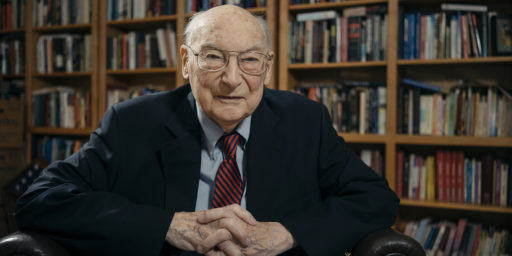Kagan: Politics Separate From Judging
Elena Kagan is not telling the truth when she says her politics are "completely separate" from her judging.
Listening to NPR‘s roundup on Day 2 of the Elena Kagan confirmation hearings, this in particular struck me:
Conservatives tested whether Kagan’s progressive political beliefs would creep into her work on the court. They picked out documents she wrote as a domestic policy adviser in the Clinton White House and in her work as a clerk to Supreme Court Justice Thurgood Marshall.
As a 27-year-old clerk, Kagan said she had tried to “channel” Marshall rather than express her own views. Kagan also allowed that she had worked in two different Democratic administrations, but she gave little more ground.
“I know my politics would be, must be, have to be completely separate from my judging,” Kagan said.
The first part of this is quite reasonable. Being a Supreme Court clerk or administration apparatchik is indeed a different job than being a Supreme Court Justice and it’s indeed likely that she “channeled” Marshall or Clinton when writing for them. And that’s to say nothing of the fact that she’s had a lot of life experience in between and her own views could well have evolved, anyway.
The second part of this, though, is a complete and utter lie. Not of the sort that’s disqualifying but rather of the sort that’s apparently compulsory. While Supreme Court Justices may, in some cases, honestly believe themselves as mere agents of the law — many don’t actually make that pretense once on the bench, openly serving as advocates for their view of Right and Wrong — it’s absurd to think that their political philosophy doesn’t greatly influence their votes on key public policy issues.
In many cases, the law simply isn’t settled. Indeed: That’s why the issue is before the Supreme Court to begin with.
Photo: Reuters Pictures







“The second part of this, though, is a complete and utter lie. Not of the sort that’s disqualifying but rather of the sort that’s apparently compulsory.”
Nice, exculpatory, head fake.
“While Supreme Court Justices may, in some cases, honestly believe themselves as mere agents of the law — many don’t actually make that pretense once on the bench, openly serving as advocates for their view of Right and Wrong — it’s absurd to think that their political philosophy doesn’t greatly influence their votes on key public policy issues.”
Maybe some here with better legal minds than mine (that would be a lot of people) can set me straight. Isn’t that the whole strict constructionist vs “living document” argument? One can say that strict constructionism is “political” I guess, but I’d call it analytical, and apolitical. But once you cross the Rubican to a “living document” then its open season: politics in spades.
And that’s the problem.
Strict Constructionists: What did the authors mean? Or I will do my best to determine what I think the original intent of the authors were within the context of their time and use of language, relying on contemporaneous material if it helps.
Textualists: What does it actually say? Or I will interpret the words in front of me as they are written as though we all are speaking the same language with a common semantic and syntactical understanding, i.e., let’s hope they wrote what they meant and meant what they wrote.
Living Documentarians: What do I think is right? Or, I will decide what the right thing is based upon my ideological prism and currently fashionable theories of social justice. What the text objectively says or what the authors meant is of little more than academic interest in today’s complex, modern world.
Which if those is most subject to “politics”? And note that none of these must necessarily be left or right, or liberal or conservative if you prefer.
James is right.
Drew and Charles: Seriously, Philosophy 101. It won’t kill you. Consciousness is by definition subjective. All the perceptions, beliefs and thoughts of homo sapiens are subjective, not objective.
This is not to deny the existence of objective reality.
To all “strict constructionists” (is that even a word?) What did the founding Fathers say about the internet? Space exploration? Bio-engineering? Birth control?
Huh? What’s that silence I hear?
Why do we even pretend that ideology is unimportant? The right leaning judges just happen to always interpret the Constitution the same way. Same for the left. Ideology, not the law is determinant. Judges do not even worry about appearances anymore. They party with leading pundits ad politicians. Their wives are involved are political activists or are even elected officials. Pass an amendment that limits SCOTUS terms to 12 years.
Steve
***To all “strict constructionists” (is that even a word?) What did the founding Fathers say about the internet? Space exploration? Bio-engineering? Birth control?***
***To promote the progress of science and useful arts, by securing for limited times to authors and inventors the exclusive right to their respective writings and discoveries;
The citizens of each state shall be entitled to all privileges and immunities of citizens in the several states.
Congress shall make no law respecting an establishment of religion, or prohibiting the free exercise thereof; or abridging the freedom of speech, or of the press; or the right of the people peaceably to assemble, and to petition the government for a redress of grievances.
As long as Property exists, it will accumulate in Individuals and Families. As long as Marriage exists, Knowledge, Property and Influence will accumulate in Families.
John Adams, letter to Thomas Jefferson, July 16, 1814
The right of the people to be secure in their persons, houses, papers, and effects, against unreasonable searches and seizures, shall not be violated, and no warrants shall issue, but upon probable cause, supported by oath or affirmation, and particularly describing the place to be searched, and the persons or things to be seized.
If Virtue & Knowledge are diffused among the People, they will never be enslav’d. This will be their great Security.
Samuel Adams, letter to James Warren, February 12, 1779
Laws for the liberal education of the youth, especially of the lower class of the people, are so extremely wise and useful, that, to a humane and generous mind, no expense for this purpose would be thought extravagant.
John Adams, Thoughts on Government, 177
It should be your care, therefore, and mine, to elevate the minds of our children and exalt their courage; to accelerate and animate their industry and activity; to excite in them an habitual contempt of meanness, abhorrence of injustice and inhumanity, and an ambition to excel in every capacity, faculty, and virtue. If we suffer their minds to grovel and creep in infancy, they will grovel all their lives.
John Adams, Dissertation on the Canon and Feudal Law, 1756
The foundation of national morality must be laid in private families…. How is it possible that Children can have any just Sense of the sacred Obligations of Morality or Religion if, from their earliest Infancy, they learn their Mothers live in habitual Infidelity to their fathers, and their fathers in as constant Infidelity to their Mothers?
John Adams, Diary, June 2, 1778
Wisdom and knowledge, as well as virtue, diffused generally among the body of the people, being necessary for the preservation of their rights and liberties, and as these depend on spreading the opportunities and advantages of education in the various parts of the country, and among the different orders of people, it shall be the duty of legislators and magistrates… to cherish the interest of literature and the sciences, and all seminaries of them.
John Adams, Thoughts on Government, 1776
Without wishing to damp the ardor of curiosity or influence the freedom of inquiry, I will hazard a prediction that, after the most industrious and impartial researchers, the longest liver of you all will find no principles, institutions or systems of education more fit in general to be transmitted to your posterity than those you have received from your ancestors.
John Adams, letter to the young men of the Philadelphia, May 7, 1798
The happy State of Matrimony is, undoubtedly, the surest and most lasting Foundation of Comfort and Love; the Source of all that endearing Tenderness and Affection which arises from Relation and Affinity; the grand Point of Property; the Cause of all good Order in the World, and what alone preserves it from the utmost Confusion; and, to sum up all, the Appointment of infinite Wisdom for these great and good Purposes.
Benjamin Franklin, Rules and Maxims for Promoting Matrimonial Happiness, October 8, 1730
There are certain social principles in human nature, from which we may draw the most solid conclusions with respect to the conduct of individuals and of communities. We love our families more than our neighbors; we love our neighbors more than our countrymen in general. The human affections, like solar heat, lose their intensity as they depart from the centre… On these principles, the attachment of the individual will be first and for ever secured by the State governments. They will be a mutual protection and support.
Alexander Hamilton, speech at the New York Ratifying Convention, June, 1788
Give up money, give up fame, give up science, give the earth itself and all it contains rather than do an immoral act. And never suppose that in any possible situation, or under any circumstances, it is best for you to do a dishonorable thing, however slightly so it may appear to you… From the practice of the purest virtue, you may be assured you will derive the most sublime comforts in every moment of life, and in the moment of death.
Thomas Jefferson, letter to Peter Carr, August 19, 1785
Man, once surrendering his reason, has no remaining guard against absurdities the most monstrous, and like a ship without rudder, is the spot of every wind. With such persons, gullibility, which they call faith, takes the helm from the hand of reason and the mind becomes a wreck.
Thomas Jefferson, letter to James Smith, December 8, 1822
Reading, reflection and time have convinced me that the interests of society require the observation of those moral precepts…in which all religions agree.
Thomas Jefferson, Westmoreland County Petition, November 2, 1785
hen in the Course of human events it becomes necessary for one people to dissolve the political bands which have connected them with another and to assume among the powers of the earth, the separate and equal station to which the Laws of Nature and of Nature’s God entitle them, a decent respect to the opinions of mankind requires that they should declare the causes which impel them to the separation.
We hold these truths to be self-evident, that all men are created equal, that they are endowed by their Creator with certain unalienable Rights, that among these are Life, Liberty and the pursuit of Happiness. — That to secure these rights, Governments are instituted among Men, deriving their just powers from the consent of the governed, — That whenever any Form of Government becomes destructive of these ends, it is the Right of the People to alter or to abolish it, and to institute new Government, laying its foundation on such principles and organizing its powers in such form, as to them shall seem most likely to effect their Safety and Happiness***
I am a trained speed reader but my eyes are starting to bleed……………
What in the great month of Sundays morning quarterbacking hell do you think they would think about mass communications, rocket ships, medical and agricultural research and breakthroughs, murdering unborn babies, and unwed sex?
***Philosophy 101. It won’t kill you. Consciousness is by definition subjective. All the perceptions, beliefs and thoughts of homo sapiens are subjective, not objective.***lol….. we know how liberals think about thinking and think, but what about the rest of us?
***This is not to deny the existence of objective reality.***lol, sure Harry, sure…….
Some of the things thrown up like “electronics” or “bio-engineering as examples of what the US Constitution does not address are so much nonsense. Gosh, how come the US Constitution didn’t dictate how to build ships? I mean, that was a concurrent, and very important technology at the time. Or precise chronographs which were extremely important for the calculation of longitude and about as high tech as it gets for 1789. Or could it be the a governing document doesn’t itself have to address technology, but only provide the framework for allowing the people to pass laws to govern themselves and protect life, liberty and property independent of the technology available, whether it be 18th century technology or 21st century technology?
In other news, the subjectivity of consciousness does not inhibit the conscious from observing and living in the objective reality. Perception is not, I repeat, is not reality. Once again, don’t let the perfect be the enemy of the good. Not everything out there goes on just within your head. I don’t accept the postmodernism that is de rigueur these days, but YMMV. But, oh, oh, oh, the Philosophy 101 remark just cuts to the bone and really puts me in my place. Man, why did I waste all those years reading that stuff in Latin anyway?
Charles:
Dude, really, it’s like watching me try to make sense talking about physics.
So James, when are you going to write about the Republican senators who trashed Marshall but could not even name one of his decisions they disagreed with?
I disagree with James that Kagan’s statement is a lie.
She said her _politics_ would be separate from her judging. James seems to have read her saying her _political philosophy_ would be separate. Those are two different things.
One’s political philosophy may be an inescapable factor in arriving at legal conclusions, but one’s politics – ones loyalties to a party, or one’s presumption of support for issues that one’s party adopts, or one’s entanglements with the personalities and concerns of a party – those factors can and should be set aside by a judge, and there seems to me to be no reason to doubt that Kagan could do so.
The Democratic Party is not a faithful or loyal vehicle for any single political philosophy, nor is the Republican Party. One can certainly be a committed liberal, and work (often with great frustration) in Democratic administrations, and then set aside ones loyalties to the party when taking up a judgeship. Yes, she will still be a liberal – she will still have a philosophy, but she does not deny that in the statement you quote.
Perception is not, I repeat, is not reality.
Do you actually think you understand what reality is?
Best quote of all time:
“If you truly understood even a single grain of wheat, you would die of wonder”.
Martin Luther
Do you actually think you understand what reality is?
In a word, yes.
Does that mean I have an omniscient understanding of everything in the universe? In a word, no.
Perfect, good, enemy, and all that.
In a word, yes.
Hmmm. The most brilliant minds in human history had healthy doubt about the accuracy of their understanding of reality, but you have it nailed. I mean really. Here you are, a frail human being with a souped up monkey brain and limited senses and you know what reality is.
Hear that sound? Its the laughter of the Gods…
anjin-san, well, since you admit that you don’t have a clue about reality, how is it that you can be so goddamned sure about so many other things?